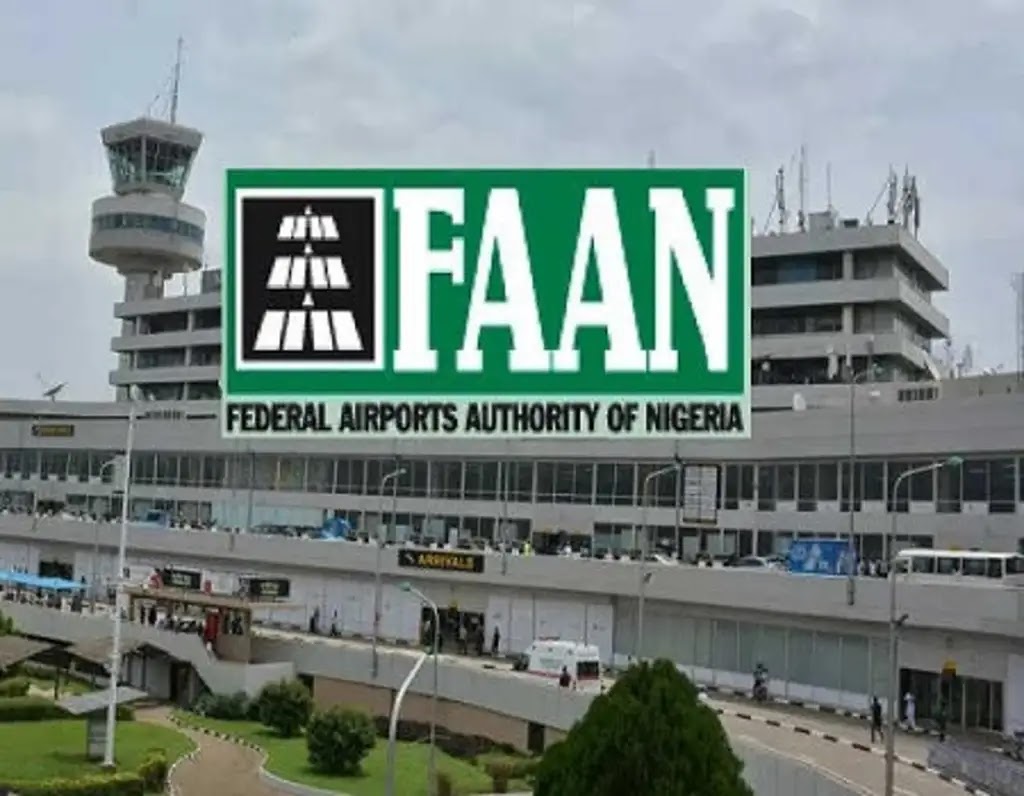FAAN trains 3,219 workers on safety courses in 2024

Federal Airports Authority of Nigeria FAAN
Abdullateef Fowewe
In a significant move towards enhancing aviation safety, the Federal Airports Authority of Nigeria has successfully trained 3,219 workers on safety courses under 11 month in 2024.
This initiative is part of FAAN’s broader Acculturation Programme aimed at fostering a culture of excellence and efficiency among its staff.
The management of FAAN under the leadership of Olubunmi Kuku as the Managing Director, within a week of inception, reviewed and signed the FAAN Corporate Safety Policy that shows the management’s commitment to accountability and responsibility to safety.
Kuku emphasised the importance of the training sessions in ensuring a safe and reliable aviation environment, urging all employees to engage actively with the materials provided.
The FAAN Deputy General Manager, of safety promotions, Ifeoma Mba, while speaking on the enormous impact of the policies of the FAAN management on the transformation of the airports noted that under the leadership of Kuku within the first 11 months of taking over in FAAN, the airports had been able to train 3,219 workers and stakeholders across six major safety critical courses for a total of 1,765 hours.
She said, “The commitment embedded in all our procedures, technology, and training programmes to ensure we are safeguarding not only passengers, but also, our staff and stakeholders. Maintaining a safe airport environment is a dynamic process that requires constant vigilance and a culture that encourages everyone, from frontline employees to senior leaders, to take ownership of safety standards. This includes engaging in rigorous inspections, provision of state-of-the-art safety aid, security systems, regular drills that prepare our teams for any scenario. We also work closely with regulatory bodies like NCAA, ICAO, ACI and other sister agencies in Nigeria to continuously review and enhance our protocol based on the latest industry advancement and best practices.
“Safety for us is more than just compliance with standards, it is a commitment we make to every person who steps into our Airport. We understand that travelers trust us with their well-being, and this is the reason why every investment we make, every policy we put in place, is about ensuring safe and reliable travel for all.”
She also confirmed how under the present management FAAN has continued to implement policies that are greatly repositioning safety and seamless air transport across the country’s airports.
Latest of such policies is the ability of the Kuku management to device a comprehensive approach involving various strategies and practices to improve safety at the airports.
Some of the key actions already taken include; continuous training and safety education through the International Civil Aviation Organization (ICAO) mandatory programmes for all staff and stakeholders, including safety, security personnel, operations, and Aerodrome fire-fighting officers.
“These trainings majorly focus on; Airside Operations and Safety Compliance Training (AOSCT), Global Reporting Format (GRF), Aerodrome General Safety Awareness (AGSA) Course, emergency protocols, crisis management, and safety procedures.
“Succinctly, this is presented in the following table SOURCE: Safety Services Training Unit Runway Maintenance through continuous provision of Surface Movement Guidance system through constant remarking of the airfield pavement and provision of signages, rigorous airfield lightening system upgrade and maintenance.Safety Management Systems (SMS) Safety Management Systems (SMS), which is the hallmark of aviation business is critically important to the airport environment for several reasons ranging from risk mitigation: SMS is designed to identify, assess, and mitigate risks associated with airport operations, which can include everything from runway incursions to baggage handling mishaps, security risks, bird strikes, ground handling incidents, operational risks, etc.
“A robust SMS helps prevent accidents and incidents, ensuring the safety of passengers, personnel, and aircraft. Regulatory Compliance: Nigeria Civil Aviation Regulations requires FAAN to implement SMS to comply with standards set forth by the International Civil Aviation Organization (ICAO). Adhering to these regulations help FAAN avoid fines and legal issues while demonstrating a commitment to safety. Continuous Improvement: SMS emphasises a proactive approach to safety management through continual monitoring, evaluation, and improvement,” MBA added.
She noted that the process allows FAAN to learn from past incidents, refine its procedures, and implement best practices, leading to an overall enhancement of safety culture, stating that an effective SMS encourages the reporting of safety concerns and incidents without fear of retribution. This open communication allows for better data collection and analysis, which is vital for identifying trends, understanding root causes, and taking corrective action to prevent future occurrences.
The ability of the FAAN management to be embrace effective SMS that can streamline processes and improve communication among teams, has led to reduced delays and enhanced operational performance.
“Also, worthy of note is how management continues to provide operational and communication tools and equipments such as camera, breathalyzer, binoculars, safety boots, Wet Floor, Safety Cones, and PPE for all safety critical departments, as well as the provision of a Safety Library across the airports to enhance safety research, data collation, compilation, and management. Improving Runway and Taxiway Design by ensuring that airside infrastructure is designed (recent upgrade and reopening of Runway 18R and 36L) at MMIA to minimize risks, such as collisions and incursions, by following best practices in airport designs and markings, including general maintenance of terminal facilities and Air Operations Area. Implementation of Comprehensive Safety Management Systems.
“This has been done through the development and maintenance of Safety Protocols and, the creation of standardized operating procedures that are subjected to regular review and update based on industry best practices and regulatory requirements.
“Under Kuku, FAAN has established an accessible reporting mechanism for employees and passengers to report safety concerns or near misses without fear of repercussions. Furthermore, FAAN management engages in active collaboration with Airport stakeholders in the resolution of critical safety concerns across airports. To foster a safety culture, the present FAAN Management has shown commitment to ensuring that airport management demonstrates a strong commitment to safety by prioritizing it in strategic decisions and resource allocation which is achieved through the three tiers of safety reporting system in FAAN, consisting of the Airport Safety Committee, Safety Coordination Group, and the Safety Management Steering Committee.
“This has brought about timely decision and intervention by management on safety critical issues across airports. Employee Engagement: we encourage a culture where employees feel that safety is a shared responsibility and are motivated to communicate issues, suggest improvements, and actively participate in safety initiatives. Our regular engagement with the union is a testament to this,” MBA stressed.




